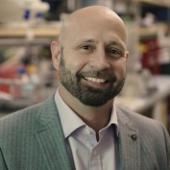Hēth Roderick Turnquist, PhD
Dr. Hēth Turnquist is an Associate Professor in the University of Pittsburgh School of Medicine, Department of Surgery, T.E. Starzl Transplantation Institute, with a secondary appointment in the Department of Immunology.
Dr. Turnquist received his BS from the South Dakota State University and his PhD, Pathology and Microbiology, from the University of Nebraska.
His current research focus is Cytokine and Regulatory Cell Networks in Transplantation. Transplantation of genetically dissimilar (allogeneic) cells, organs, and composite tissues is a transformative procedure used to prolong and improve quality of life. Yet, these foreign materials initiate alloreactive immune responses. These pathogenic immune responses mediate destruction of transplanted tissues or alternatively, attack host tissues. The present answer to combat alloimmunity is global immune suppression, which is only partially effective and associated with morbidity- and mortality-causing toxicities and complications. Research in the Turnquist Lab aims to elucidate novel endogenous immunoregulatory mechanisms that can benefit transplant recipients by providing alternatives to non-specific immunosuppressants. The Turnquist team is approaching this in two related areas of study:
- The primary focus is an improved understanding of how cytokines, which are small cell-signaling molecules with local and systemic functions, shape transplant outcomes. Of particular interest to our group is IL-33, a recently-identified IL-1 family member. Our early work established that IL-33 is a pleiotropic cytokine that supports Type 1, Type 2, and T regulatory responses. Barrier cells, such as the gut and lung epithelium and cardiovascular endothelium, express IL-33. Given that transplantation surgery, alloimmune recognition, or radiation therapy preceding allogeneic hematopoietic stem cell transplantation (HSCT) damages barrier cells, we are now establishing the processes that facilitate IL-33 release from these cells, as well as elucidating the mechanisms shaping the pro-inflammatory versus regulatory capacity of this novel cytokine in solid organ and HSCT rodent transplant models.
- Myeloid cells, such as dendritic cells (DC) or myeloid-derived suppressor cells (MDSC) are now well accepted to be potent endogenous regulators of immune responses. The team is also actively developing an improved understanding of the targetable signaling pathways that control their generations, cytokine production, and their immunoregulatory or stimulatory functions in transplantation.
View a list of Dr. Turnquist’s publications here.

